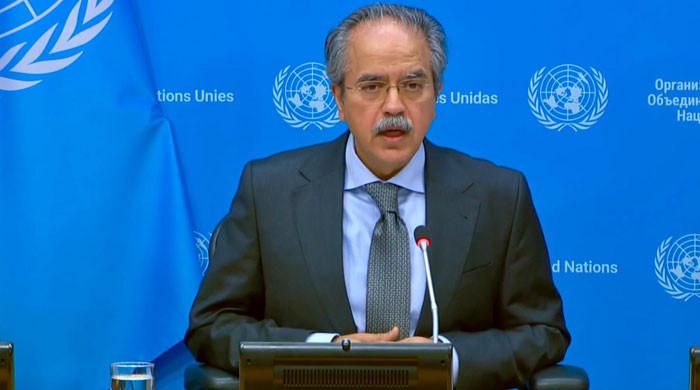Pakistan Urges UN Security Council to Resolve Kashmir Dispute
Pakistan has appealed to the United Nations Security Council (UNSC) to take immediate action in order to settle the Kashmir dispute, according to Ambassador Asim Iftikhar Ahmad, the country’s permanent representative to the UN.
Ahmad’s statement coincided with Pakistan assuming the presidency of the Council for the month of July. He emphasized that the prolonged Kashmir issue is a significant source of strain between Pakistan and India.
During a press briefing at the UN headquarters in New York, he asserted that the global community should intervene promptly rather than allowing the issue to be forgotten.
Responding to a question at the press conference, he stated, “It is imperative to address the Kashmir dispute. This responsibility falls not only on Pakistan, which holds a temporary, two-year non-permanent membership.”
Ambassador Asim Iftikhar added, “I believe the Security Council itself, particularly its permanent members, must ensure that steps are taken to implement their resolutions. That is the optimal path forward.”
Prior to the press conference, the 15-member Council convened to approve the work schedule for July.
Ambassador Asim Iftikhar informed the UN correspondents, “Our strategy is firmly anchored in the UN Charter’s aims and principles, which include the peaceful resolution of conflicts, sovereign equality, adherence to international law, and multilateralism.”
Pakistan will host two key events during its presidency: a high-level discussion on Promoting International Peace and Security through Multilateralism and Peaceful Settlement of Disputes, scheduled for July 22, and another on UN-OIC cooperation on July 24. Senator Ishaq Dar, the Deputy Prime Minister and Foreign Minister, will preside over both discussions.
Moreover, DPM/FM Dar will also lead the quarterly open debate on Palestine on July 23.
The Pakistani envoy explained, “These debates are motivated by the understanding that contemporary crises often arise from unresolved disputes, the disregard of international obligations, and the insufficient utilization of peaceful methods as outlined in Chapter VI of the Charter.”
“Our objectives are to evaluate the effectiveness of dispute resolution mechanisms, examine impediments to the implementation of Council decisions, explore strategies to enhance diplomacy, mediation, and technical assistance, and reinforce the commitments outlined in the Pact for the Future regarding preventive diplomacy and peaceful conflict resolution.”
Regarding Kashmir, Ambassador Asim Iftikhar noted that any issue on the Security Council’s agenda can be discussed at any moment, and the long-standing dispute over the Himalayan region is included under the India–Pakistan question.
He said that the UN Security Council has issued several resolutions that, among other provisions, guarantee the Kashmiri people’s right to self-determination.
The Pakistan envoy highlighted, “It is a persistent conflict with peace and security, political and legal, and human rights dimensions.”
He further stated, “This unresolved issue is a source of tension between India and Pakistan, hindering the development of amicable relations in our region. It is crucial to address this matter.”
The Council will continue to prioritize significant global issues, including the Middle East and developments in Africa, Europe, Asia, and Latin America.
Pakistan’s two-year tenure as a non-permanent member of the UNSC, which began in January 2025, includes the presidency of the Security Council. The presidency is assigned on a monthly rotational basis among its 15 members in alphabetical order.
Pakistan previously served on the Council in 2012–13, 2003–04, 1993–94, 1983–84, 1976–77, 1968–69, and 1952–53.
Pakistan was elected as a non-permanent member with significant backing from the UN membership, securing 182 votes out of 193.



Comments (0)
No comments yet. Be the first to comment!
Leave a Comment